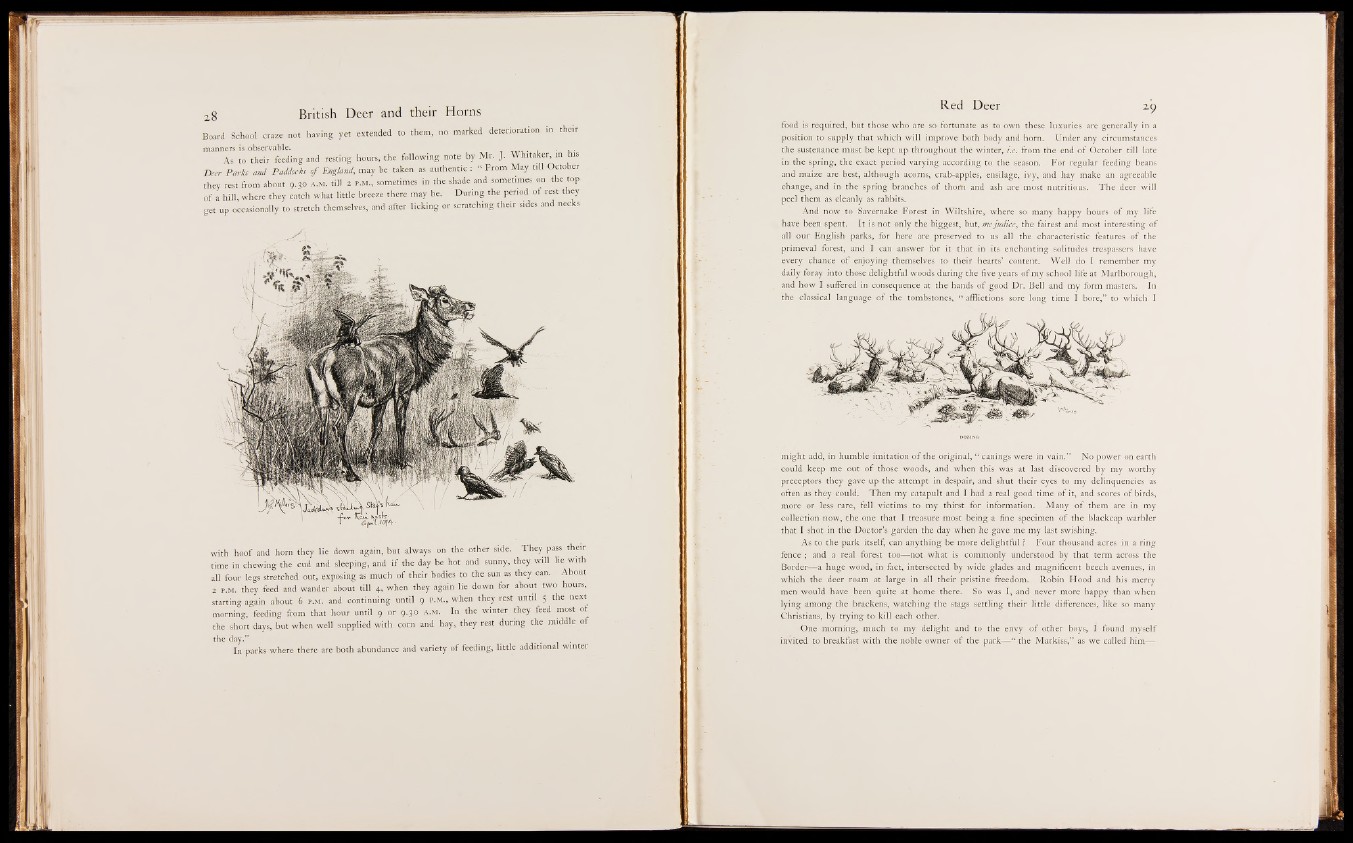
Board School craze not having yet ex-tended. In them, »0 marked deterioration in their
manners is observable. .
As to their feeding and resting hours, the following note by Mr. J. Whitaker, in his
Deer Parks and Paddocks o f England, may be taken, as- authentic : I From May till OctqlSgr
they rest from about 9.30 a .m . till 2 F.M.jUSometimes in the shade and sometimes on the top
o f a hill, where they catch what little breeze there may be. During the period o f rest they
get up occasionally to stretch themselves, and after liokin^ar scratching their sides and n e e®
with hoof and horn they lie down again, but a lw a | |b h the oth er^d e. T hey pan" their
time in chewing the cud and isleeping, a n | I f the day be hot and sunny, they, will I f with
all four le g is t retched out, exposing as much. :tif their bodies tb the sun.aS they canw About
2 r.M . they feed and wander about till 4, when they again lie down for about two h o i® |
starting again about 6 p.M. and continuing until 9 P .M ., when they rest until 5 the next
morning, feeding from that hour unffl ^H r B um. In the winter .they feed most of
the |j§S»days, but when well supplied w ith® m and hay; they rest during the middle ipf
the day.” . . . .
In parks where there are both abundance and variety o f feeding, little additional winter
food is required, but those who are so fortunate as to own these luxuries are generally in a
position to supply that which will improve both body and horn. Under any circumstances
the sustenance must be kept up throughout the winter, i.e. from the end o f October till late
in the spring, the exact period varying according to the season. For regular feeding beans
and maize are best, although acorns, crab-apples, ensilage, ivy, and hay make an agreeable
change, and in the spring branches o f thorn and ash are most nutritious. T h e deer will
peel them ^ cleanly as rabbits.
And now to Savernake Forest in Wiltshire, where so many happy hours o f my life
have been -spent. It is not only the biggest, but, me judice, the fairest and most interesting o f
all our English parks, for here are preserved to us all the characteristic features o f the
primeval forest, and I can answer for it that in its enchanting solitudes trespassers have
every chance o f enjoying themselves to their hearts’ content. Well do I remember my
daily foray into those delightful woods during the five years o f my school life at Marlborough,
and how I suffered in consequence at the hands o f good Dr. Bell and my form masters. In
the classical language o f the tombstones, “ afflictions sore long time I bore,” to which I
might add, in humble imitation o f the original, “ canings were in vain.” No power on earth
could keep me out o f those woods, and when this was at last discovered by my worthy
preceptors they gave up the attempt in despair, and shut their eyes to my delinquencies as
often as they could. Then my catapult and I had a real good time o f it, and scores o f birds,
more or less rare, fell victims to my thirst for information. Many o f them are in my
collection now, the one that I treasure most being a fine specimen o f the blackcap warbler
that I shot in the Doctor’s garden the day when he gave me my last swishing.
As to the park itself, can anything be more delightful ? Four thousand acres in a ring
fence ; and a real forest too— -not what is commonly understood by that term across the
Border— a huge wood, in fact, intersected by wide glades and magnificent beech avenues, in
which the deer roam at large in all their pristine freedom. Robin Hood and his merry
men would have been quite at home there. - So, was I, and never more happy than when
lying among the brackens, watching the stags settling their little differences, like so many
Christians, by trying to kill each other.
One morning, much to my delight and to the envy o f other boys, I found myself
invited to breakfast with the noble owner o f the park— “ the Markiss,” as we called him—